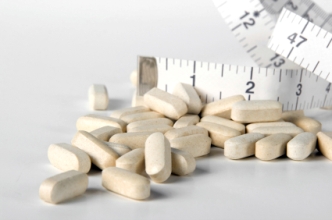Take it Slow on the Seasonal Run for Supplements
Take it Slow on the Seasonal Run for Supplements

Fall is almost over, which means that—at least for dieters—we’re heading into the scariest part of the year. Holiday season!
From the minute those leftover Halloween candies hit the clearance table, it’s a non-stop onslaught of sweets, treats, desserts and indulgences. So, a lot of consumers decide to call in reinforcements, and head for the supplement section of their drug or discount stores to find them.
If you’re going to use dietary supplements as a component to aide in your weight-loss, you need to know what you’re up against. There are always new products appearing on the shelves, so let’s have a quick overview.
However, it’s important to keep in mind that supplements will not help you unless you give your body the fuel it needs, a.k.a. good, nutritious food. If you have poor eating habits, your body will not be able to fully absorb the supplements, but we’ll have more on that later.
Thermogenic Agents
Thermogenic agents are so-called fat-burning drugs that increase energy expenditure. In the United States, there are no approved thermogenic medications for obesity, but that doesn’t keep manufacturers of unregulated supplements from throwing the term around.
Hence, many of Dr. Cederquist’s patients come in asking about “natural” thermogenic enhancers. They see advertisements for supplements that offer “increased fat-burning” with enticing names that evoke healthy images: metabo- this and thermo-that.
But you don’t want to be fooled by these fancy names and marketing ploys. These products are often wolves disguised in sheep’s clothing.
While the really dangerous products containing ephedrine—from the plants known as ma huang or ephedra—were banned from the U.S. last year, many of the remaining products are simply sources of related compounds, such as synephrine. The fact that they’re ephedra-free is often proudly emblazoned across the label.
This is not unlike a food manufacturer claiming a food product is sugar-free, because it’s been sweetened with corn syrup instead of cane sugar. Consumers have to see through the smoke screens.
Like ephedrine, synephrine increases release of norephinephrine in the brain, which could decrease appetite. When mixed with caffeine, the combination can produce a slightly increased thermogenic effect, but it also increases heart rate and blood pressure, which lead to so many of the tragic deaths and health crisis caused by ephedra-based products.
Watch out for products containing extracts of bitter orange or country mallow, which is also known as heartleaf, both related to the banned ephedra.
And remember that these “natural” products can interact with your prescription medications or other supplements in some surprising, even dangerous, ways. Always check with your doctor or pharmacist for possible interactions.
Digestion Inhibitors
Some people are using supplements of psyllium and other fibers like barley and guar gum for weight loss. Like some pharmaceuticals, they can prevent fats from being absorbed.
But instead of inhibiting enzymatic breakdown of fats as drugs like Orlistat do, these fibers prevent absorption by binding to fats in the gut. This lets some portion of fats pass right through the body as harmless passengers on the fiber.
That’s why increasing fiber intake decreases blood lipid levels. But there is little evidence that these fibers alone actually help decrease weight in heavy patients. Guar gum has been studied the most, but on its own, it does not seem to be working for weight loss.
The best weight-loss or weight-control effect to be drawn from fiber comes from simply consuming more of your daily calories from dietary fiber sources.
If you’re looking for that fat-blocking function, try eating almonds in moderation. They’re high in fiber and good monounsaturated fatty acids, and while almonds are no miracle munchie, recent research shows that the cellular walls in almonds also have a lipase-blocking property, preventing some absorption of fats in the gut.
Other Enticing Promises
Some patients also ask me about trying dietary supplements that affect serotonin levels in the brain, in particular, St. John’s wort and 5-HTP. With respect to the appetite suppressant effects of supplements that act on the serotonin function, St. John’s wort has a long and solid history as an herbal anti-depressant.
It’s true that St. John’s wort can inhibit serotonin reuptake, and because of this, it is prescribed as an anti-depressant in some European countries. But there is no reliable evidence it helps reduce weight in obese patients, and it doesn’t consistently produce weight loss in patients who take it for depression.
A huge number of other supplements are being tried for obesity. One of the hottest is conjugated linoleic acid (CLA). CLA refers to isomers of the fatty acid linoleic acid, which is primarily found in dairy products and beef. Researchers theorize that CLA might shrink adipose tissue by inducing apoptosis (programmed cell death) of fat cells.
There’s preliminary evidence that three to four grams of CLA per day might reduce the proportional level of body fat mass, but not actual weight or body mass index.
“These findings are interesting, and I think it’s too soon to put much store in them since these supplements are pretty expensive for this minor effect,” said Dr. Cederquist.
Chromium is being used to address obesity-related conditions like hyperlipidemia, diabetes, and obesity. The theory is that American diets are deficient in chromium, which can lead to diabetes, overweight and other metabolic abnormalities. There is some evidence that chromium can help reduce lipid and glucose levels in people with diabetes. But chromium doesn’t seem to help for actual weight loss.
Garcinia cambogia fruit and rind extracts contain up to 50% of hydroxycitric acid, which manufacturers claim inhibits the body’s production of lipids. This ingredient appears in tons of supplements promoted for weight loss. But a study published in the Journal of the American Medical Association shows that it has no significant effect on weight so we say: don’t bother.
Through Thick & Thin:
When it comes to supplements, consumers need to carefully sort through the marketing blitz. A few supplements show some promise, but there’s not enough evidence to recommend them. Especially try to avoid potentially dangerous products that contain country mallow or bitter orange that provide ephedrine-like drugs.
Living longer and healthier is definitely possible, but the only way to get there is by paying attention to how you eat and live. If you’re looking for something fast and convenient without the hassle of frequenting the grocery store, bistroMD offers diet plans that can help you successfully lose weight.
We cook with the freshest ingredients and have over 200 recipes and a customizable menu so you should have no problem finding something to satisfy your taste buds.
We believe in the science that food is medicine. Good, balanced and nutritious meals are the fuel your body needs to stay healthy.
Every bite you take follows this proven approach for healthy weight loss. Our program provides 1,100-1,400 calories daily with 40-50% total caloric intake from lean, adequate protein, 20-25% of calories from healthy fats, and 30-35% from complex carbohydrates.
The best part is that it only takes a few weeks to start seeing results and you don’t have anything to lose, but the fat!
-
Healthy Diet Foods for Weight Loss
Who said all diet foods were boring and
-
Unhealthy Fad Diets Side Effects
Most of the fad diets are popularly termed as yo-yo diets that give y
-
One Drink Recipe that Flushes Fat Away by Dr. Oz
The main ingredient of this miraculous recipe that will flush away
-
Health Benefits of the DASH Diet and 9 Delicious Recipes
It’s been ranked the No. 1 Bes
-
The One Day Diet – Cleanse Your Body and Lose Weight !
Green tea is amazing for your health, but how much do you actually
-
Elimination Diet: How To and Is It Right for You?
Do you have a hunch that something i
- DON'T MISS
- The Best 7 Yoga Poses to Lose Weight Fast – Highly Effective
- Grams of Protein Per Day – How Much Do You Need To Eat Daily?
- Alkaline diet review
- Diet plan – “Why is your Diet Plan May Not Be Working”
- Eating little & often does NOT boost metabolism
- Healthy Eating -Eat a wide variety of foods for a healthy diet
- What is HCG Diet and can it help you lose weight?
- Get A Flat Stomach – This Delicious Drink Can Help Blast Your Belly Fat
- Perricone Diet Plans
- Healthy Lunch Ideas at the Office




